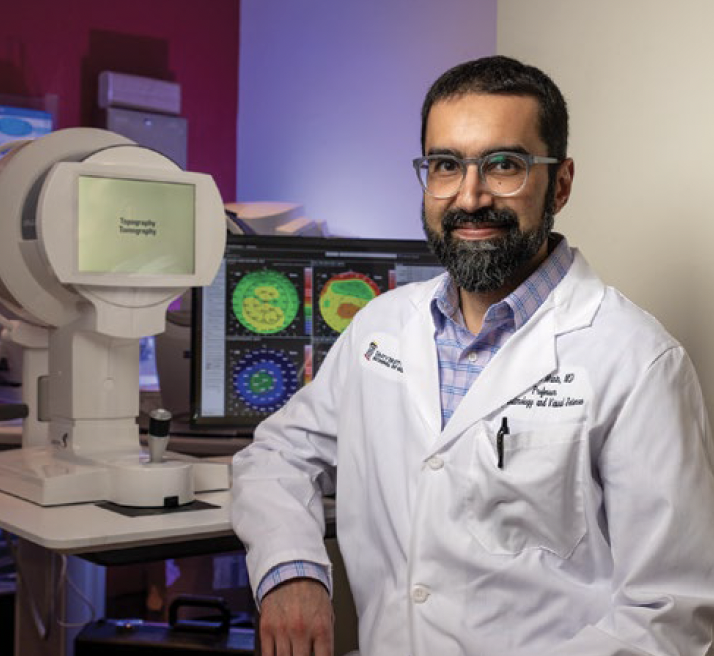Partner Content
“Any sudden change in eyesight should be addressed immediately.”
Dr. Munir wanted to be a doctor from an early age. In ophthalmology he found the perfect field, one that brought together his interest in helping people maintain good health and his fascination with technology. As a cornea specialist, Munir uses the latest advances, including laser technology, to help patients maintain one of their greatest assets: their sight. Below he discusses common eye diseases, their treatment, and the keys to healthy vision.
What interests you about the cornea specifically?
This field is fascinating to me, in that these small, fine structures are so critical to our amazing blessing we call sight. And we have great treatments and surgeries to fix many common problems with these structures.
When is a change in eyesight cause to see a doctor?
Certain eye conditions can be diagnosed by an eye exam before someone knows they even have a problem. For that reason, children should follow their pediatrician’s guidelines for regular eye screenings, healthy adults should get an exam at age 40, and those 65-plus should have an eye exam every few years.
Any sudden change in eyesight should be addressed immediately. Eyesight that is slowly getting blurrier can also be a sign of a problem, especially when it starts to affect activities such driving, reading, or watching TV.
How common is astigmatism, and what causes it?
Astigmatism is a very common and usually normal condition of the eye. Some people have a very round cornea (the front of the eye) shaped more like a soccer ball while those with astigmatism have one shaped more like an oblong football. Most people with astigmatism can simply be treated with glasses.
Similarly, what are cataracts and how has cataract surgery advanced in recent years?
Cataract is a cloudy lens that develops most commonly as we age, and generally develops in both eyes. Cataracts can affect eyesight in many ways including reducing our ability to focus up close, decreasing our vision overall, and experiencing glare, like when bright headlights approach from oncoming cars at night. Cataract surgery continues to evolve, and a number of new advancements have brought exciting changes to the field such as the use of lasers to assist with surgery. New, artificial lenses used to replace the cloudy cataract now have designs that give sharper vision and more range.
What can people do to prevent cataracts?
Unfortunately, the prevention of cataracts remains an area of research, but we do think reducing UV exposure by wearing sunglasses from a young age, and a lifetime healthy diet may help. Genetics likely plays a role and not everyone develops cataracts that need surgery.
People may be familiar with refractive surgery, or laser surgery to improve vision. Who is a good candidate for this procedure and how long do the results last?
A laser is used to reshape the front of the eye (the cornea) to change the power of the eye so additional vision aids are not as necessary. Most people are good candidates for this procedure, with a few exceptions. Laser vision correction essentially lasts forever. Sometimes the effect can partially wear off, what we call regression, but this is not common. Blurry vision years after surgery may be another eye issue, such as cataracts.
Can you speak on the current research being conducted in the field of ophthalmology?
An exciting area is light adjustable lenses. Putting an artificial lens in the eye that’s the exact right power was a calculation, but with these new lenses, the power of the lens can be adjusted after surgery. In cornea, we are looking forward to current research in growing the back layer of the cornea (the endothelium) in the lab and injecting it into the eye of people with malfunctioning cells, which could greatly reduce the need for corneal transplants in some patients.
What are your top tips for maintaining good eye health?
Good eye health starts with treating any eye conditions appropriately under the direction of an eye doctor. For contact lens wearers, it is important to follow cleaning and hygiene directions, including not sleeping in contacts and throwing them out in timely fashion. Glasses wearers should have their prescription periodically checked. Good hygiene is a must— remove makeup before bed and always keep one’s eyelids clean. A healthy diet, especially one rich in omega-3 fatty acids and routine vitamins, can promote eye health and help avoid certain conditions.

MEET THE EXPERT:
Wuqaas M. Munir, MD
Professor of Ophthalmology & Visual Sciences,
University of Maryland School of Medicine
Chief of the Cornea Service,
University of Maryland Eye Associates
Location: Downtown Baltimore
Appointments: 667-214-1111

